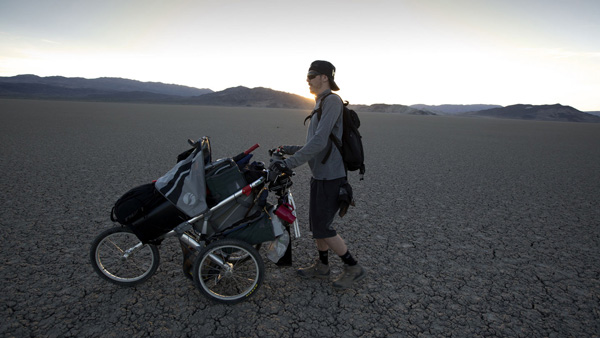Less a documentary than a 90-minute infomercial, the earnest Coming to My Senses centers on Aaron Baker, who was an aspiring young motocross athlete when a terrible accident left him a quadriplegic. The film delves into how he regained mobility, which is an undeniably inspiring story. But along the way, it builds a temple to its main subject and asks viewers to come worship there, which somewhat blunts its well-meaning message.
After an opening that shows the protagonist’s attempt to walk across Death Valley, the film cuts to home movies of Baker, where we see him grow up with a substantial amount of independence, the result of his parents splitting soon after his birth. Motocross becomes a way for him to bond with his father whenever the latter is around, though for Baker, the main appeal is the feeling of liberation whenever he is on a bike. He repeatedly wipes out in what looks like a genuinely dangerous sport, until one day as a young adult, tragedy befalls him.
The only upside of such a terrible event is that it brings Baker’s family together, leading to touching moments such as when Aaron’s slightly younger sister, Arielle, paints his toenails while he lies paralyzed in a hospital bed. The sister, however, quickly falls by the wayside in favor of Aaron’s mother, Laquita Dian, who finds taking care of him to be extremely stressful, his chronic depression fueling her alcoholism. To get an idea of the emotional depths he sank to: Aaron stares at his old bike helmet, pondering aloud whether it saved his life or ended it.
Clearly, Baker was not the happiest of campers, but while the film seems to readily empathize with the difficulty of his recovery, it is surprisingly unsympathetic toward Dian. Admittedly, she does something boneheaded that nearly leads to serious legal peril, but her true sin, at least as director Dominic Gill seems to envision it, is not having an infinite amount of patience for her son. It’s a curious double standard: while being confined to a wheelchair could of course make someone bitter, why is there only space for Baker’s negative emotions?
Ultimately, the only narrative that matters to the filmmakers is Baker’s; everyone else exists solely to help or hinder him. That group seemingly includes all doctors, who reportedly gave Baker a one-in-a-million chance of regaining his mobility. (If you miss that statement the first time Baker or a family member says it, don’t worry, it gets repeated a lot throughout.) From early on, the film draws a sharp line separating medical professionals and physical therapists, dismissing the former while giving the latter the full-on miracle worker treatment. That’s especially true of one therapist in particular, Taylor-Kevin Isaacs, who does get Baker walking again, although their five years spent making this happen gets compressed into a montage lasting mere seconds.
There is a compelling story in here about someone who loses their independence and, in the course of getting some of it back, learns to rely on others—specifically his mother, with whom he rediscovers his former love of racing on the back of a tandem bicycle. As Aaron starts to take part in charitable events to raise awareness of the possibilities of regaining mobility, more people become part of his life. Yet the focus always comes back to just him: his thoughts, his needs, his suffering. That’s how we end up in Death Valley, watching Baker walk across it at a painfully slow stretch of a few miles per day. The event itself proves to be a bit of a letdown. Despite Baker’s goal of reasserting his own independence, there are moments in which he ends up desperately needing the director to help him.
Coming to My Senses bears some resemblance to another documentary, Roll with Me, which premiered at the Slamdance Film Festival earlier this year and centered on a man who similarly refuses to let a traumatic spinal injury define his life. But that film frequently showed its protagonist as flawed and human, whereas this one goes to great lengths to point out just how special Baker is. By the end, the reason to do so becomes clear, with the not-so-subtle marketing for the Center of Restorative Exercise, or CORE, a recovery-themed clinic run by none other than Baker, Dian, and Isaacs. Be warned: even if you sit through this entire film, you will never be offered any discount off an initial consultation.







Leave A Comment